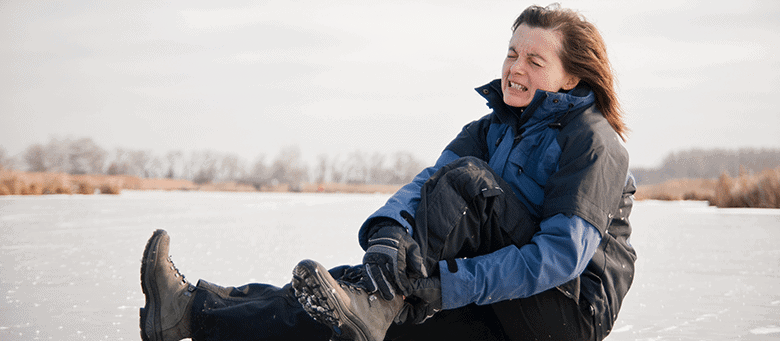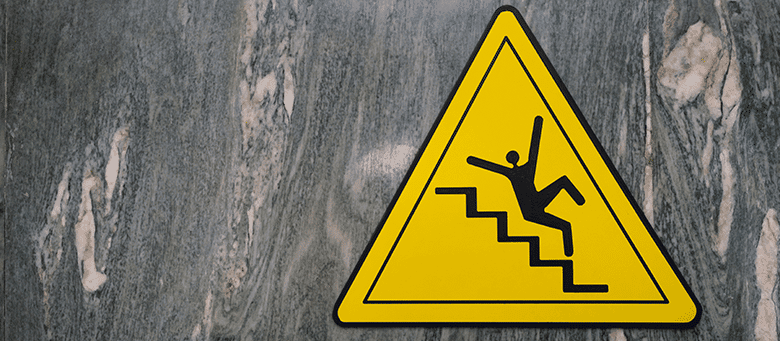What Are Slip And Fall Cases About?
Legally Reviewed and Edited by: Terry Cochran

Have you fallen and injured yourself? Are you wondering if someone has been negligent and is liable for your injury?
Michigan slip and fall law — what are these cases about?
What Happened?
Across the nation, there are almost 550,000 slip and fall injuries each year requiring hospital care. Over 300,000 of these injuries are disabling, and, for seniors, one in three serious bone breaks result in death within one year of the accident.
If you believe that your fall was caused by the negligence of another — usually the property owner or the possessor of land where the accident occurred — then you may have the basis for a personal injury lawsuit to recover damages.
A slip and fall accident can happen in almost any location, a wet floor at the store, an uneven or icy sidewalk, but not every situation suggests legal liability. Consulting with an attorney, a Michigan slip and fall lawyer at our law firm, can help to clarify your options.
Where Did You Fall?
Was it black ice in a parking lot? Was it loose carpeting on a stairway? Was the hazardous condition that precipitated your accident and injury something the business owner has known about for some time and refused to fix?
Property owners have a responsibility and legal duty to perform maintenance, but to be proven responsible for your fall, and held liable for your injuries, you must be able to prove that the property owner:
- Caused or created the slippery or dangerous surface, or impediment.
- Knew about the dangerous condition, surface, and/or impediment, and did nothing about it.
- Should have known about the dangerous condition, because any reasonable person responsible for the property would have seen the problem and resolved it.
Contributory vs. Comparative Negligence
Under the rule of contributory negligence, the defendant in a personal injury lawsuit must be proven to be 100% responsible for the accident that caused your injury. If the defendant is able to prove that you, the plaintiff, are partially responsible, then you aren’t entitled to any compensation. Only five states/jurisdictions still follow this rule, and Michigan is not one of them.
Michigan has adopted a modified comparative negligence rule that says that an individual can seek damages even if you had some fault in the accident.
For example, if someone trips and falls on unsafe pavement, but was texting at the time, both parties are liable? Who is more liable?
Over 50% Rule

In Michigan law, you can recover damages in a slip and fall case even if you are partially responsible. However, the law states that a person seeking damages can’t be more than 50% at fault.
It is important to remember that a judge or jury only determines the injured person’s comparative negligence after it determines whether the defendant was negligent. If you go to trial in your slip and fall case, and the jury finds that the defendant was not negligent, the case is over. There isn’t a need to determine your negligence, as the plaintiff, if that is the verdict.
If, however, the jury finds that the defendant was negligent, then it considers whether the plaintiff was also negligent. If it is found that the plaintiff was also negligent, then the jury or judge compares the fault of the plaintiff and the fault of the defendant and determines the percentage of fault for each party. For example, the jury might find that the defendant’s negligence was 80% responsible for the injury and the plaintiff was 20% at fault.
The most important thing to know about comparative negligence is that the plaintiff’s negligence will reduce the amount of the plaintiff’s verdict by the percentage of fault assigned to the plaintiff by the judge or jury.
Recent Slip And Fall Supreme Court Ruling
In April, 2019, the Michigan Supreme Court ruled, in Celestine Stacker, Personal Representative of the Estate of Mae Hendrix, v. Lautrec, Ltd., for the plaintiff. The case was about a tenant who slipped and fell on her apartment complex driveway, on a patch of ice that had unnaturally accumulated from a garage downspout.
The case raised interesting issues about the responsibility of landlords in maintaining a property for its intended use. In this case, the intended use was a parking lot, intended for the mixed-use purpose of storing cars and walking. Was the puddle of ice in violation of MCL 554.139, which states that landlords must ensure the premises and all common areas — such as a driveway — are fit for their intended use?
The original claim, filed in Oakland County, was dismissed. The Court of Appeals reversed this decision, and then that ruling was appealed by the property owner to the Supreme Court. The Supreme Court upheld the Court of Appeals ruling on behalf of the plaintiff.
One of the interesting things about this case and ruling is that it created a new, high profile discussion about intended use, landlord maintenance responsibilities, and liability in slip and fall cases, and it also defied legal precedent.
Previous decisions had validated the “open and obvious” defense that landlords often use in slip and fall cases. This defense strategy says that property owners are not legally responsible for any condition — including snow and ice — that is there to be seen.
Know the Statute of Limitations
It takes time to gather evidence, conduct interviews, and secure expert testimony, if necessary. If the out-of-court settlement process with the insurance company is unsatisfactory, the statute of limitations for filing personal injury cases is three years from the date of the injury.
The professionals at Cochran, Kroll & Associates, P.C. want to hear your story, learn about your situation, explore the details of your slip and fall accident, and consider options with you.
Initial consultations are always at no cost. If we decide to work together, we charge on a contingency basis, which means we do not get paid until we secure a settlement for you. All contingency fee agreements are in writing, and in Michigan, the legal fees are set by statute (MRPC Rule 1.5) and can be up to one-third of the recovery award.
Contact us toll-free at 1-866-MICH-LAW or use our convenient online contact form to set up a free consultation to discuss your case.
Disclaimer : The information provided is general and not for legal advice. The blogs are not intended to provide legal counsel and no attorney-client relationship is created nor intended.



